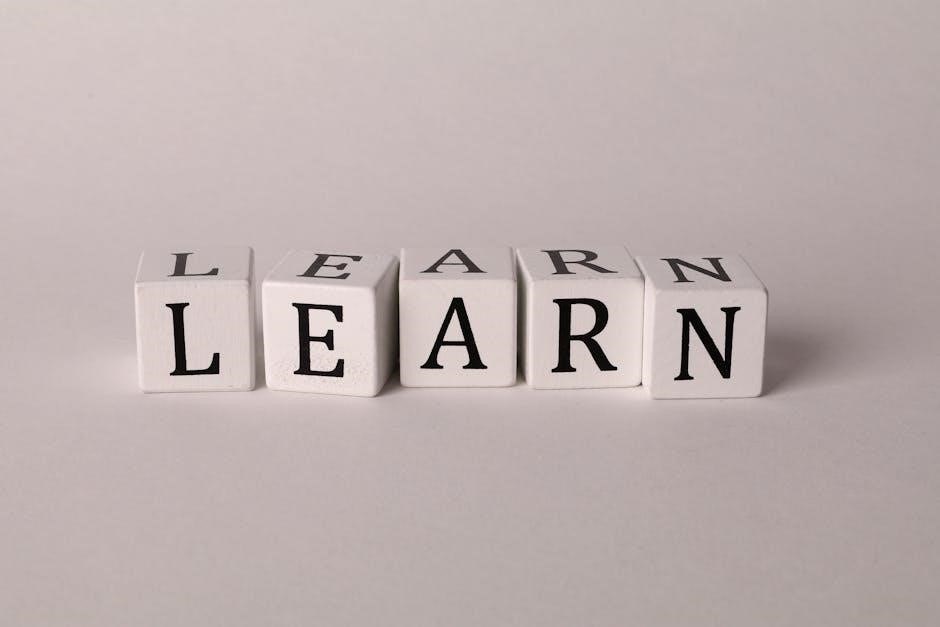
The Curriculum and Instruction Certification is a specialized credential designed for educators seeking to enhance their expertise in curriculum design, instructional strategies, and educational leadership․ It offers a pathway for teachers and professionals to advance their skills in creating effective lesson plans, assessments, and educational programs, while also providing opportunities for career growth in leadership roles within schools and districts․
Understanding the Basics
The Curriculum and Instruction Certification focuses on developing expertise in curriculum design, instructional strategies, and educational leadership․ It equips educators with the skills to create standards-based curricula, assessments, and instructional techniques tailored to diverse learning needs․ This certification is designed for teachers, administrators, and education professionals seeking to enhance their ability to design and implement effective educational programs․ It emphasizes the integration of theoretical knowledge with practical applications, ensuring educators can address the complexities of modern classrooms․ The certification is often pursued by those aiming to advance into leadership roles or specialize in curriculum development․ By focusing on foundational principles, it provides a comprehensive understanding of how to align teaching practices with educational standards and student outcomes․

Why Certification Matters
Obtaining a Curriculum and Instruction Certification is crucial for educators aiming to enhance their professional impact and career prospects․ This certification demonstrates a commitment to excellence in curriculum design, instructional strategies, and educational leadership, setting certified professionals apart in their field․ It provides educators with advanced skills to create engaging, inclusive, and effective learning experiences, directly benefiting student outcomes․ Additionally, certification often leads to increased job opportunities, higher salaries, and access to leadership roles such as curriculum specialists or instructional supervisors․ It also signifies a deep understanding of current educational trends and research-based practices, ensuring educators are well-equipped to meet the evolving needs of students and schools; Ultimately, this certification is a valuable investment in both professional growth and the ability to make a meaningful difference in education․

Types of Curriculum and Instruction Certifications

Curriculum and Instruction certifications include Teacher Certification, Curriculum Specialist Certification, Supervisory Certification, Graduate Certificates, and Specialized Certifications, each catering to different educational roles and career goals․
Teacher Certification
Teacher Certification in Curriculum and Instruction is designed for educators seeking to enhance their instructional skills and deepen their understanding of curriculum design․ This certification focuses on improving teaching methods, classroom management, and student engagement․ It is ideal for current or aspiring teachers who want to specialize in creating effective lesson plans and assessing student progress․ The certification often includes coursework in educational theory, technology integration, and subject-specific teaching strategies․ By obtaining this certification, teachers can demonstrate their commitment to professional growth and their ability to deliver high-quality instruction․ It also prepares educators to adapt curriculum to diverse student needs, ensuring inclusive and equitable learning environments․ This certification is a key step for teachers aiming to advance their careers and make a greater impact in the classroom․
Curriculum Specialist Certification
The Curriculum Specialist Certification is tailored for educators who want to focus on the development, implementation, and evaluation of educational programs․ This certification prepares professionals to take on leadership roles in curriculum design, ensuring that instructional materials align with educational standards․ It emphasizes the ability to analyze learning objectives, assess program effectiveness, and collaborate with teachers and administrators․ The certification often involves advanced coursework in curriculum theory, educational research, and instructional strategies․ Curriculum specialists play a crucial role in shaping the educational experience, making this certification ideal for those passionate about improving teaching and learning at a systemic level․ It also offers opportunities for professional growth, enabling specialists to influence educational policies and practices․
Supervisory Certification
Supervisory Certification is designed for educators aiming to transition into leadership roles, such as department chairs, curriculum supervisors, or instructional leaders․ This certification focuses on developing skills in managing educational programs, overseeing curriculum implementation, and leading teaching staff․ It emphasizes leadership training, strategic planning, and the ability to evaluate and improve educational outcomes․ The certification prepares individuals to handle administrative responsibilities, fostering a collaborative environment and aligning instructional practices with institutional goals․ It is ideal for those interested in shaping educational policies and practices at a higher level․ By obtaining this certification, educators can enhance their leadership capabilities and advance their careers in educational administration․
Graduate Certificates
Graduate certificates in Curriculum and Instruction are specialized programs designed for educators seeking advanced knowledge in curriculum design, instructional strategies, and educational leadership․ These certificates are typically shorter than full master’s programs, focusing on specific areas like curriculum development, technology integration, or special education․ They offer flexibility, allowing professionals to enhance their skills without committing to a full degree․ Many programs are tailored for working teachers, offering online or hybrid formats․ Coursework often includes advanced topics in curriculum theory, assessment methods, and innovative teaching practices․ Graduate certificates are ideal for those looking to deepen their expertise, stay updated on educational trends, or transition into specialized roles․ They also serve as stepping stones for further graduate studies or leadership positions in education․
Specialized Certifications
Specialized certifications in Curriculum and Instruction cater to educators seeking expertise in specific areas, such as STEM education, special education, or bilingual instruction․ These certifications allow professionals to focus on niche student populations or innovative teaching methodologies․ For example, certifications in gifted education or English language learning enable teachers to address diverse student needs effectively․ Specialized certifications are often earned through targeted coursework, workshops, or professional development programs․ They demonstrate a teacher’s commitment to advancing their skills in a particular field, enhancing their ability to design and implement effective curricula․ These certifications can also open doors to leadership roles or specialized positions within schools or districts, making them a valuable asset for career advancement and improving student outcomes․

Curriculum and Instruction Certification Process
The certification process involves meeting eligibility criteria, completing required courses, submitting prerequisites, and passing certification exams to demonstrate expertise in curriculum design and instructional strategies․
Eligibility Criteria

Earning a curriculum and instruction certification requires meeting specific eligibility criteria․ Typically, candidates must hold a bachelor’s degree from an accredited institution, often in education or a related field․ Many programs require prior teaching experience, which can vary from 1-3 years depending on the certifying body․ Additionally, some certifications may mandate completion of specific coursework in education, curriculum design, or instructional strategies․ A minimum GPA, often 3․0 or higher, may also be required for admission to graduate-level programs․ Certain certifications, such as those for curriculum specialists, may require a master’s degree or higher․ Eligibility criteria can vary by institution or certifying organization, so it’s essential to review requirements carefully before applying․
Required Courses and Training
Curriculum and instruction certification programs typically require completing a series of specialized courses and training sessions․ These courses focus on curriculum design, instructional strategies, and educational leadership․ Candidates often study theories of learning, assessment methods, and techniques for integrating technology into classrooms․ Many programs include practical training, such as creating lesson plans and implementing curriculum frameworks․ Some certifications may involve workshops or seminars on specific topics like differentiated instruction or culturally responsive teaching․ Additionally, hands-on experiences, such as practicum or fieldwork, are often mandated to apply theoretical knowledge in real-world settings․ Coursework may also cover educational research, data-driven decision-making, and collaboration with colleagues․ These requirements ensure candidates are well-prepared to lead and innovate in educational environments․
Prerequisites for Application
Applicants seeking curriculum and instruction certification must meet specific prerequisites before applying․ Typically, a bachelor’s degree in education or a related field is required․ Some programs may also require a certain number of years of teaching experience, depending on the certification level․ Additionally, candidates must hold a valid teaching certification in their state or country, as this program often builds on existing teaching credentials․ A minimum GPA, usually 3․0 or higher, may be required for graduate-level certifications․ Letters of recommendation from academic or professional mentors are often needed․ Some programs may also require standardized test scores, such as the GRE, though this varies by institution․ Coursework in education theory, curriculum design, and instructional methods is often expected․ Meeting these prerequisites ensures candidates are adequately prepared for the rigor of the certification program․
Application Process
The application process for curriculum and instruction certification typically involves several steps․ Candidates must submit an official application through the institution’s online portal or certification body․ Transcripts from previous academic degrees and standardized test scores, if required, must be uploaded or sent directly․ Letters of recommendation from academic or professional mentors are often needed, along with a resume highlighting relevant teaching or educational experience․ Some programs may require additional documents, such as a personal statement outlining career goals or a portfolio of prior work․ An application fee is usually required to process the submission․ Once all materials are received, the admissions committee reviews the application․ If approved, candidates are notified and may proceed to the next steps, such as enrolling in courses or preparing for exams․ A well-prepared application ensures a smooth transition into the certification program․
Certification Exams
Certification exams for curriculum and instruction are standardized assessments designed to evaluate a candidate’s knowledge and skills in designing, implementing, and assessing educational programs․ These exams often include multiple-choice questions and may also involve performance-based tasks or portfolio reviews, depending on the certifying body․ The content typically covers curriculum development, instructional strategies, educational theories, and assessment methodologies․ Candidates are generally allowed a set amount of time to complete the exam, and passing scores vary by certification type․ Preparation materials, such as study guides and practice exams, are usually available to help candidates succeed․ The exam serves as a critical step in demonstrating mastery of the subject matter and readiness to contribute effectively to educational settings․ Successful completion of the exam is a key requirement for obtaining certification․

Maintaining Certification
Maintaining certification requires ongoing professional development, continuing education, and staying updated with educational standards and methodologies to ensure effective teaching and leadership in curriculum design․
Professional Development Requirements
Professional development is crucial for maintaining curriculum and instruction certification․ It ensures educators stay updated on teaching methodologies and curriculum standards․ Requirements often include completing a set number of continuing education hours or credits every few years, typically through approved courses, workshops, or conferences․ These activities may cover topics like educational technology, diversity and inclusion, and innovative teaching strategies․ Some programs allow for flexibility, enabling professionals to choose relevant workshops or online courses that align with their career goals․ Additionally, participation in peer mentoring or leading professional development sessions may count toward requirements․ These ongoing efforts ensure that educators continue to provide high-quality instruction and adapt to evolving educational practices, ultimately benefiting both their professional growth and student outcomes․
Renewal Process
The renewal process for curriculum and instruction certification typically involves several steps to ensure continued competency․ Certification holders must submit an application for renewal, usually through an online portal, and pay the required fee․ They must also provide documentation of completed professional development hours or courses, as specified by the certifying body․ Some certifications require passing a renewal exam or demonstrating ongoing involvement in educational leadership or curriculum development․ The renewal period varies, often every 5-7 years, depending on the issuing organization․ Timely renewal ensures uninterrupted certification status and reflects a commitment to professional growth; Failure to meet deadlines or requirements may result in lapse of certification, requiring additional steps to reinstate․ Staying informed about renewal timelines and requirements is essential to maintain active certification․

Costs and Financial Aid
Costs for curriculum and instruction certification vary by institution and program type․ Financial aid options, including scholarships, grants, and loans, are available to eligible candidates․
Program Fees
Program fees for curriculum and instruction certification vary depending on the institution and the type of program․ On average, certification programs can range from $500 to $3,000 or more, with costs differing between online and on-campus options․ Public universities often charge lower fees for in-state students compared to out-of-state learners․ Additionally, some programs may include costs for course materials, exams, or workshops․ It’s important to check with the specific institution for detailed pricing․ Many programs offer payment plans or discounts for early enrollment․ Some employers also reimburse tuition fees as part of professional development benefits․ Always verify the total cost before enrolling to ensure it aligns with your budget and career goals․
Scholarships and Aid Options
Several scholarships and financial aid options are available to support individuals pursuing curriculum and instruction certification․ Many educational institutions offer scholarships specifically for teachers or educators advancing their skills․ Federal and state governments also provide financial aid through grants and loans․ Professional organizations, such as the National Education Association (NEA), often offer funding opportunities for educators․ Additionally, private foundations and corporations may provide scholarships for specialized certifications․ Some employers offer tuition reimbursement programs to encourage professional development․ Online databases and platforms can help applicants find relevant scholarships․ It’s essential to research and apply early, as many programs have deadlines and eligibility criteria․ These resources can significantly reduce the financial burden of certification, making it more accessible for educators to enhance their expertise․

Career Opportunities Post-Certification
Curriculum and instruction certification opens doors to diverse roles such as curriculum developers, instructional coaches, and education consultants across K-12, higher education, and corporate training sectors․
Roles in Education Leadership
Curriculum and instruction certification prepares educators for leadership roles in shaping educational programs․ Professionals can become curriculum specialists, designing and implementing school-wide curricula․ They may also serve as instructional coaches, mentoring teachers to enhance classroom practices․ Additionally, certification qualifies individuals for roles like department heads or educational consultants, where they can influence district-level policies and reforms․ Leaders in education often oversee professional development initiatives, ensuring faculty stays updated on best practices․ These roles allow certified professionals to drive innovation, improve student outcomes, and foster a culture of continuous improvement in educational institutions․ The certification equips leaders with the expertise to address diverse learning needs and manage complex educational systems effectively․

Impact on Teaching Careers
Curriculum and instruction certification significantly enhances teaching careers by equipping educators with advanced teaching strategies and curriculum design skills․ Certified professionals often experience career advancement, including promotions or higher salary brackets․ The certification enables teachers to create more engaging and effective lesson plans, fostering better student outcomes․ It also positions them as experts in curriculum development, making them valuable assets to schools and districts․ Additionally, the certification opens doors to leadership roles, such as department chairs or curriculum coordinators․ Teachers with this certification are better prepared to address diverse student needs and integrate innovative teaching methods, ultimately improving their overall impact in the classroom and beyond․
Curriculum and instruction certification fosters professional growth, enhances teaching skills, and advances educators’ careers, making it a valuable investment for lifelong educational impact․
Final Thoughts
Earning a curriculum and instruction certification is a transformative step for educators, offering enhanced teaching strategies and leadership skills․ It equips professionals with the tools to design innovative curricula, fostering student engagement and academic success․ This certification not only advances individual careers but also contributes to the broader goal of improving educational outcomes․ By pursuing this credential, educators demonstrate a commitment to lifelong learning and professional growth․ The certification serves as a catalyst for creating impactful learning experiences, inspiring future generations, and shaping the future of education․ It is a strategic investment in both personal and professional development, empowering educators to make a lasting difference in their classrooms and beyond․
Next Steps
After obtaining a curriculum and instruction certification, the next steps involve applying the newfound knowledge and skills in practical settings․ Educators should seek opportunities to implement innovative teaching strategies and curriculum designs in their classrooms or schools․ Professional networking is crucial; joining educational associations or attending conferences can provide valuable connections and resources․ Additionally, staying updated on educational trends and research ensures continuous growth․ Many certified professionals pursue leadership roles or specialize further in areas like instructional technology or special education․ Finally, sharing expertise through mentoring or presenting at workshops can inspire others and reinforce one’s own understanding․ Taking these steps not only enhances individual careers but also contributes to the advancement of education as a whole․